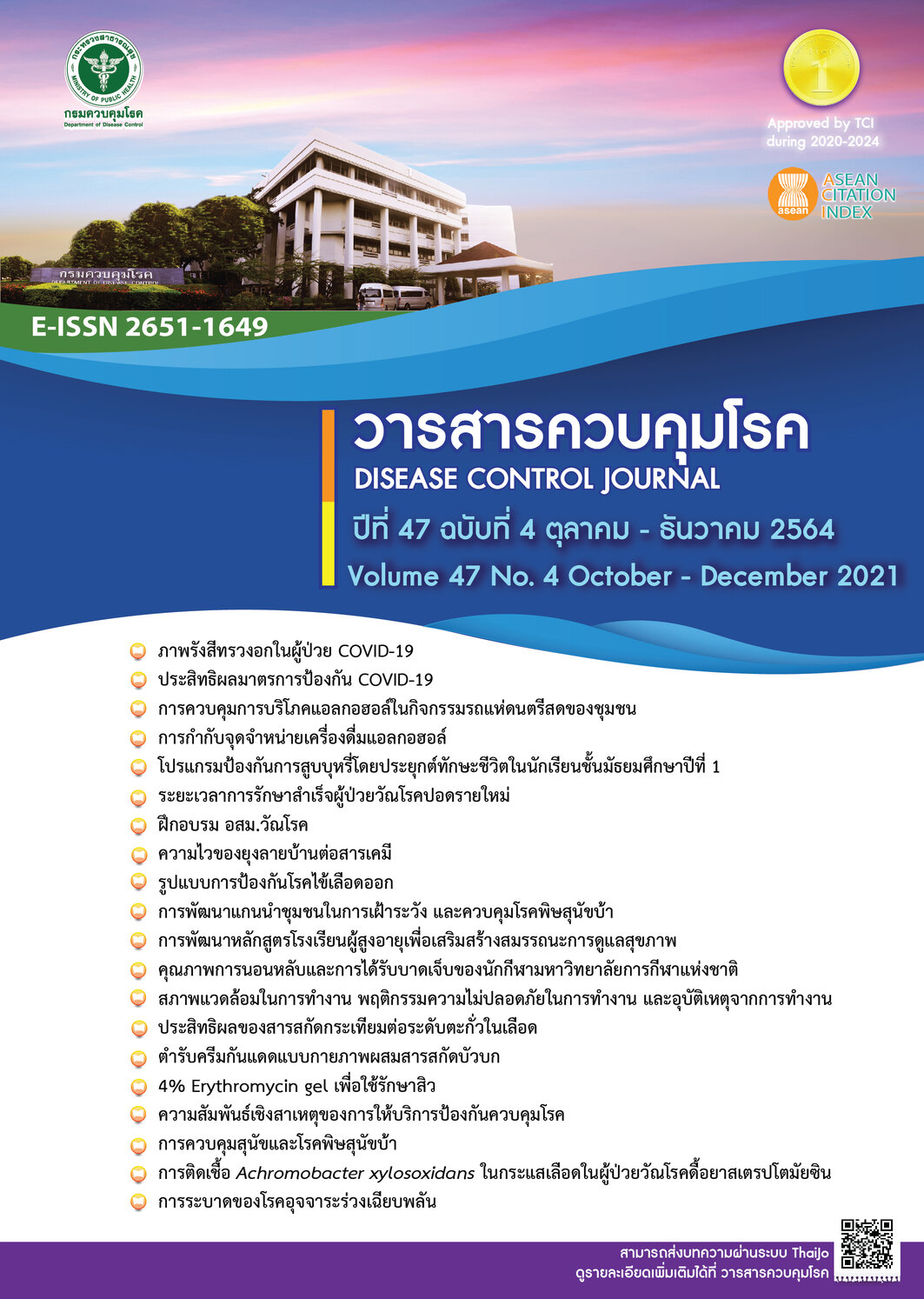Chest Radiographic Findings in COVID-19 patients
DOI:
https://doi.org/10.14456/dcj.2021.77Keywords:
COVID-19, SARS-CoV-2, chest radiographAbstract
Background: Coronavirus disease 2019 (COVID-19) is an ongoing global pandemic disease. The chest radiograph (CXR) has been used to evaluate severity of COVID-19 pneumonia. Objective: This study aimed to describe the correlation between CXR findings and clinical symptoms in COVID-19 and the time course of lung changes on the CXR relative to the initial symptoms. Methods: This retrospective study evaluated COVID-19 patients treated at the Bamrasnaradura Infectious Disease Institute during January 1 - April 1, 2020. Patients were divided into 4 groups, namely, asymptomatic, mild disease, moderate disease and severe disease. 158 patients included in the study had initial CXR for review. Of which, 135 patients had follow-up CXR available for review. Results: During the study period, there were 158 COVID-19 patients. 63.3% were males. The average age of patients was 41.8 years. Of 158 patients, 44.3% had abnormal initial CXR. Among 88 patients who had normal initial CXR, 17.0% subsequently showed abnormality on the follow-up CXR. The most common parenchymal opacity was ground glass opacity at 90% of the initial CXR and 73.8% of the peak stage CXR. Lesions were more likely to be multifocal and bilateral involvement, both central and peripheral distribution, and lower zone predominant. Pleural effusion was seen in 1.4% of the initial CXR and 10% of the peak stage CXR. Pleural effusion was only found in severe disease group. The mean duration from initial symptoms to the peak stage CXR was 10.9 + 4.5 days. Conclusion: Patients in moderate and severe disease groups might have normal initial CXR. The most common CXR findings of COVID-19 pneumonia were ground glass opacity, multifocal and bilateral lungs involvement, both central and peripheral distribution and lower lung zone predominant. The duration from initial symptoms to the peak stage CXR was around 11 days.
Downloads
References
Lu H, Stratton CW, Tang YW. Outbreak of pneumonia of unknown etiology in Wuhan, China: The mystery and the miracle. J Med Vi-rol. 2020;92(4):401-2.
World Health Organization. Naming the corona- virus disease (COVID-2019) and the virus that causes it [Internet]. Geneva [cited 2020 Mar 20]. Available from: https://www.who.int/ emergencies/diseases/novel-coronavirus- 2019/technical-guidance/naming-the-corona- virus-disease-(covid-2019)-and-the-virus- that-causes-it
World Health Organization. Coronavirus disease 2019 (COVID-19) Situation Report-51 [In- ternet]. Geneva [cited 2020 Mar 20]. Available from: https://www.who.int/docs/default- source/coronaviruse/situation-reports/ 20200311-sitrep-51-covid-19.pdf?s- fvrsn=1ba62e57_10
Wu Y, Chen C, Chan Y. The outbreak of COVID-19: An over view. J Chin Med Assoc. 2020;83(3):217-20.
World Health Organization. Clinical management of COVID-19: Interim guidance, 27 May 2020 [Internet]. Geneva [cited 2020 Jun 6]. Available from: https://www.who.int/publications/i/ item/clinical-management-of- covid-19
Li Y, Xia L. Coronavirus Disease 2019 (COVID-19): Role of Chest CT in Diagnosis and Management. AJR Am J Roentgenol. 2020;214(6):1280-6. doi: 10.2214/AJR. 20. 22954.
Zhao W, Zhong Z, Xie X, Yu Q, Liu J. Relation Between Chest CT Findings and Clinical Condi- tions of Coronavirus Disease (COVID-19) Pneumonia: A Multicenter Study. AJR Am J. Roentgenol 2020;214(5):1072-7. doi: 10.2214/ AJR.20.22976.
Xu X, Yu C, Qu J, Zhang L, Jiang S, Huang D, et al. Imaging and clinical features of patients with 2019 novel coronavirus SARS-CoV-2. Eur J Nucl Med Mol Imaing. 2020;47(5):1275- 80.
Ng M-Y, Lee EY, Yang J, Yang F, Li X, Wang H, et al. Imaging Profile of the COVID-19 In- fection: Radiologic Findings and Literature Re- view. Radiol Cardiothorac Imaging. 2020;2(1):e200034. doi:10.1148/ryct.2020200034.
Koo HJ, Lim S, Choe J, Choi SH, Sung H, Do KH. Radiographic and CT Features of Viral Pneumonia. RadioGraphics. 2018;38(3):719-39.
Franquet T. Imaging of Pulmonary Viral Pneu- monia. Radiology. 2011;260(1):18-39.
Hansell DM, Bankier AA, MacMahon H, Mc- Loud TC, Müller NL, Remy J. Fleischner Society: Glossary of terms for thoracic imaging. Radiolo- gy. 2008;246(3):697 722.
Das KM, Lee EY, Al Jawder SE, Enani MA, Singh R, Skakni L, et al. Acute Middle East Re- spiratory Syndrome Coronavirus: Temporal Lung Changes Observed on the Chest Radiographs of 55 Patients. AJR Am J Roentgenol. 2015; 205(3):W267-74.
Romero Starke K, Petereit-Haack G, Schubert M, Kämpf D, Schliebner A, Hegewald J, et al. The Age-Related Risk of Severe Outcomes Due to COVID-19 Infection: A Rapid Review, Me- ta-Analysis, and Meta-Regression. Int J Environ Res Public Health. 2020;17(16):5974. doi: 10.3390/ijerph17165974.
Shi H, Han X, Jiang N, Cao Y, Alwalid O, Gu J, et al. Radiological findings from 81 patients with COVID-19 pneumonia in Wuhan, China: a descriptive study. Lancet Infect Dis. 2020;20(4):425-34. doi: 10.1016/S1473-3099(20)30086-4.
Wong HYF, Lam HYS, Fong AH, Leung ST, Chin TW, Lo CSY, et al. Frequency and Distri- bution of Chest Radiographic Findings in COVID-19 Positive Patients. Radiology. 2020; 296(2):E72-8. doi: 10.1148/radiol. 202020
Pan F, Ye T, Sun P, Gui S, Liang B, Li L, et al. Time Course of Lung Changes On Chest CT During Recovery From 2019 Novel Coronavirus (COVID-19) Pneumonia Radiology. 2020; 295(3):715-21. doi: 10.1148/radiol.20202
Zhou S, Wang Y, Zhu T, Xia L. CT Features of Coronavirus Disease 2019 (COVID-19) Pneumonia in 62 Patients in Wuhan, China. AJR Am J Roentgenol. 2020;214(6):1287-94. doi: 10.2214/AJR.20.22975.
Downloads
Published
How to Cite
Issue
Section
License
Articles published in the Disease Control Journal are considered as academic work, research or analysis of the personal opinion of the authors, not the opinion of the Thailand Department of Disease Control or editorial team. The authors must be responsible for their articles.






